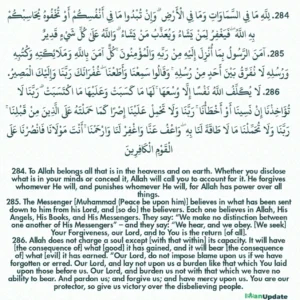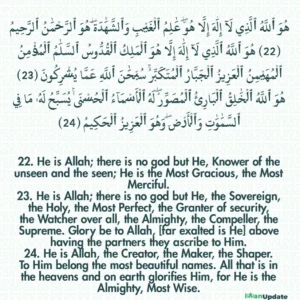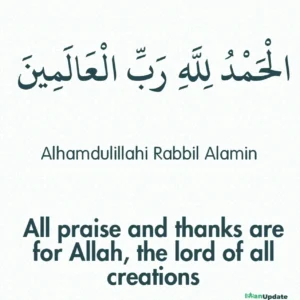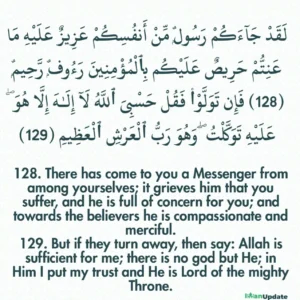Amana Rasulu Bima Unzila Ilayhi Meaning, Arabic & Benefits

Surah al-Baqarah, the second and longest chapter of the Quran, comprising 286 verses, concludes with two verses known as Amanar Rasul.
These verses hold great significance in the Quran and are revered by Muslims for their profound message and blessings.
Reciting Amanar Rasul is believed to offer immense protection from evil and is often recited before sleep.
Arabic Text of Amanar Rasul
Here is the full Arabic text of Amana Rasulu verses:
285. آمَنَ الرَّسُولُ بِمَا أُنْزِلَ إِلَيْهِ مِنْ رَبِّهِ وَالْمُؤْمِنُونَ ۚ كُلٌّ آمَنَ بِاللَّهِ وَمَلَائِكَتِهِ وَكُتُبِهِ وَرُسُلِهِ لَا نُفَرِّقُ بَيْنَ أَحَدٍ مِنْ رُسُلِهِ ۚ وَقَالُوا سَمِعْنَا وَأَطَعْنَا ۖ غُفْرَانَكَ رَبَّنَا وَإِلَيْكَ الْمَصِيرُ.
286. لَا يُكَلِّفُ اللَّهُ نَفْسًا إِلَّا وُسْعَهَا ۚ لَهَا مَا كَسَبَتْ وَعَلَيْهَا مَا اكْتَسَبَتْ ۗ رَبَّنَا لَا تُؤَاخِذْنَا إِنْ نَسِينَا أَوْ أَخْطَأْنَا ۚ رَبَّنَا وَلَا تَحْمِلْ عَلَيْنَا إِصْرًا كَمَا حَمَلْتَهُ عَلَى الَّذِينَ مِنْ قَبْلِنَا ۚ رَبَّنَا وَلَا تُحَمِّلْنَا مَا لَا طَاقَةَ لَنَا بِهِ ۖ وَاعْفُ عَنَّا وَاغْفِرْ لَنَا وَارْحَمْنَا ۚ أَنْتَ مَوْلَانَا فَانْصُرْنَا عَلَى الْقَوْمِ الْكَافِرِينَ
Transliteration
The transliteration and Pronounciation of these verses are:
285. Aamanar-Rasoolu bimaaa unzila ilaihi mir-Rabbihee walmu’minoon; kullun aamana billaahi wa Malaaa’ikathihee wa Kutubhihee wa Rusulihee laa nufarriqu baina ahadim-mir-Rusulih wa qaaloo sami’naa wa ata’naa ghufraanaka Rabbanaa wa ilaikal-maseer.
286. Laa yukalliful-laahu nafsan illaa wus’ahaa; lahaa maa kasabat wa ‘alaihaa maktasabat; Rabbanaa laa tu’aakhiznaaa in naseenaaa aw akhtaanaa; Rabbanaa wa laa tahmil-‘alainaaa isran kamaa hamaltahoo ‘alal-lazeena min qablinaa; Rabbanaa wa laa tuhammilnaa maa laa taaqata lanaa bih; wa’fu ‘annaa waghfir lanaa warhamnaa; Anta mawlaanaa fansurnaa ‘alal qawmil kaafireen.
Amana Rasulu Bima Unzila Ilayhi Meaning in English
285. The interpretation meaning of Amana Rasulu is The Messenger [Muhammad (Peace be upon him)] believes in what has been sent down to him from his Lord, and [so do] the believers. Each one believes in Allah, His Angels, His Books, and His Messengers. They say: “We make no distinction between one another of His Messengers” – and they say: “We hear, and we obey. [We seek] Your Forgiveness, our Lord, and to You is the return [of all].
286. Allah does not charge a soul except [with that within] its capacity. It will have [the consequence of] what [good] it has gained, and it will bear [the consequence of] what [evil] it has earned. “Our Lord, do not impose blame upon us if we have forgotten or erred. Our Lord, and lay not upon us a burden like that which You laid upon those before us. Our Lord, and burden us not with that which we have no ability to bear. And pardon us; and forgive us; and have mercy upon us. You are our protector, so give us victory over the disbelieving people.
READ ALSO: Kullu Nafsin Zaikatul Maut Meaning, Arabic Text, Surah Name, and Ayat
Amana Rasulu Surah
The surah which amana rasul is mentioned is Surah Al Baqarah, verse 285-286. It is also called the last two verses of Surah al-Baqarah.
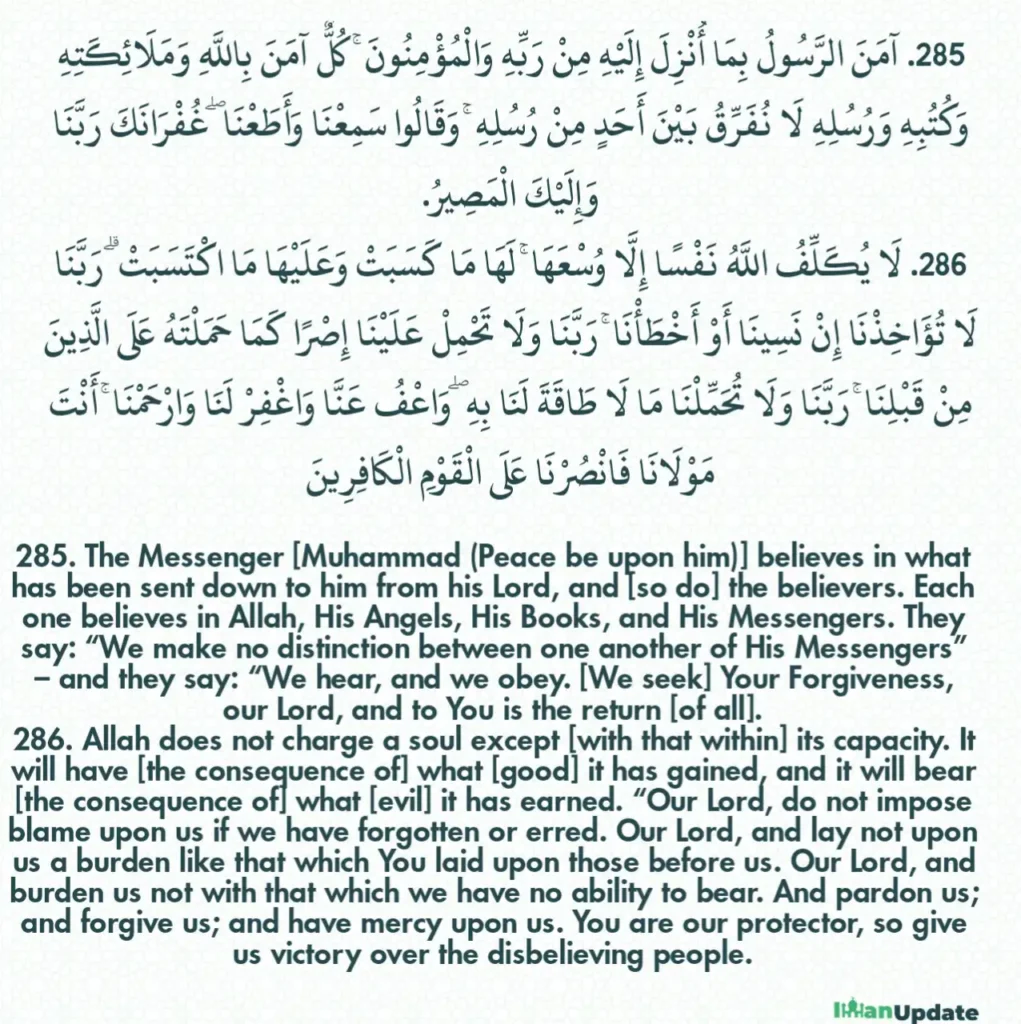
Amanar Rasulu Benefits
1) A Treasure from Beneath the Throne of Allah
On the authority of Hudhayfah and Abu Dhar (رضي الله عنه): that the Messenger of Allah (ﷺ) said: “I was given these final Ayaat from Suratul Baqarah from a treasure underneath the Throne, no prophet was given them before me.”
[Collected by al Imaam Ahmad, at-Tabarani and ibn Hibbaan, declared authentic by al-Albani: refer to Saheeh al Jaami’ as Sagheer No. 1060]
On the authority of Hudhayfah (رضي الله عنه): that the Messenger of Allah (ﷺ) said: “We were favored over other people by three things; our rows [in prayer] are like the rows of the angels, all of earth was made as a place of worship for us, and its soil a purification if we cannot find water, and I was given these last Ayaat from Suratul Baqarah from a treasure underneath the Throne, no prophet was given them before me.”
[Collected by Muslim, Ahmad and an-Nasaa’i, declared authentic by al-Albani: Saheeh al Jaam’ as Sagheer No. 4223]
On the Authority of ‘Uqbah ibn ‘Aamir (رضي الله عنه): that the Messenger of Allah (ﷺ) said: “Read these last two Ayaat of Suratul Baqarah, for indeed my Lord has given them to me from underneath the Throne.”
[Collected by al Imaam Ahmad and at-Tabarani. Declared authentic by al-Albani in Saheeh al Jaami’ No. 1172]
2) It will suffice you during the night.
Narrated Abu Mas’ud Al-Ansari (رضي الله عنه): that the Messenger of Allah (ﷺ) said: “Whoever recites the last two Ayat of Surat Al-Baqarah during the night, they shall suffice him.”
[Narrated by al-Bukhari 5009 and others]
It was said that the meaning of ‘sufficient for him’ is that they are sufficient for him instead of night prayer; it was also said: sufficient as protection from the devil, and it was further said: sufficient as protection from calamities; or possibly all those meanings put together. This is said by Imaam An-Nawawi in Sharh Saheeh Muslim.
Al-Haafith Ibn Hajar said in Al-Fat-h, “The first interpretation was explicitly reported by ‘Aasim from ‘Alqamah from Ibn Mas’ood, “Whoever recites (the two verses at) the end of Soorat Al-Baqarah, it will be sufficient for him instead of standing in prayer for one night.”
3) Protecting the Home from Shaytan
Narrated An-Nu’man bin Bashir (رضي الله عنه): that the Prophet (ﷺ) said: “Indeed Allah wrote in a book two thousand years before He created the heavens and the earth, and He sent down two Ayat from it to end Surat Al-Baqarah with. If they are recited for three nights in a home, no Shaitan shall come near it.”
[Narrated by at-Tirmidhi and others; Authentic by al-Albani in Saheeh al Jaami’ as Sagheer 1799]
4) Every word is a source of Blessings
Ibn ‘Abbas (رضي الله عنه) reported: While Jibril (Gabriel) was sitting with the Messenger of Allah (ﷺ), he heard a sound above him. He lifted his head, and said: “This is a gate which has been opened in heaven today. It was never opened before.”
Then an angel descended through it, he said: “This is an angel who has come down to earth. He never came down before.” He sent greetings and said: “Rejoice with two lights given to you. Such lights were not given to any Prophet before you.
These (lights) are: Fatihah-til-Kitab (Surat Al-Fatihah), and the concluding Ayat of Surat Al-Baqarah. You will never recite a word from them without being given the blessings it contains.”
[Muslim 806, Sunan an-Nasa’i 912 and others]

